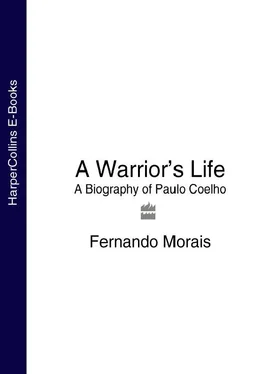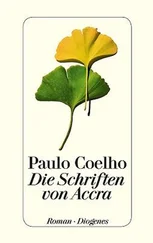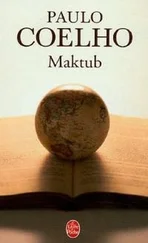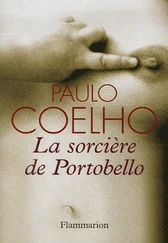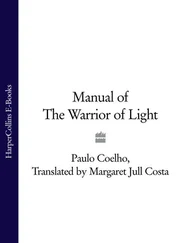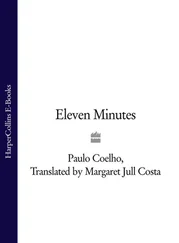Packed in an acrylic box so that it can be transported safely, the gift creates a small incident at Charles de Gaulle airport, when the police demand that the package be passed through an X-ray machine in order to prove that it doesn’t conceal drugs or explosives; unfortunately, it’s too big for the machine. Coelho refuses to board without the cloak, while the police maintain that, if it can’t be X-rayed, it can’t travel. A superior officer notices the small crowd gathering, recognizes M. Coelho and resolves the deadlock: the cloak is taken on to the plane without being scanned.
When the couple arrive at the church in Prague, some two dozen faithful are there, all apparently foreigners. Since he speaks only Czech and Italian, the Carmelite priest, Anastasio Roggero, appears not to understand quite who this person is and what he is doing in his church holding a red cloak. He listens to what Coelho is saying to him in English, smiles, thanks him and is preparing to stow the box away behind a cupboard in the sacristy when an old French woman recognizes the author.
In an inappropriately loud voice, she tells the members of her group: ‘Look, it’s the writer Paulo Coelho!’
All the tourist groups converge on him, clamouring for his autograph and to have their photo taken with him. Father Anastasio turns, looks again at the cloak he is holding and begins to realize his mistake. He apologizes to Coelho for not having recognized him or the significance of the gift the Infant Jesus has just received. He returns to the sacristy and comes back armed with a digital camera to take photos of the cloak, the tourists and, of course, himself with his famous visitor, whose work he claims to know well.
Once Coelho has settled his account with the Infant Child, the couple spend their free time revisiting the capital and seeing Leonardo Oiticica, Christina’s brother, who is married to Tatiana, a diplomat at the Brazilian embassy in Prague. Two newspapers – Pravó and Komsomólskaia – have now publicized Paulo Coelho’s presence in the city, and so the intended blitzkrieg cannot be a genuinely spontaneous event. By three in the afternoon, an hour before the agreed time, hundreds of people are lined up outside the Empik Megastore, the enormous modern bookshop chosen by Coelho’s Czech publisher, Argo. He arrives at the agreed hour and finds things much as they were in Budapest. This time only 150 readers have managed to get vouchers, but hundreds of people are filling the aisles of the shop and spilling out into Wenceslas Square. They all want an autograph. The author does what he did in Hungary: he asks the bookshop to provide everyone with water, and divides the waiting crowd into those with vouchers and those without. At six in the evening, he looks at his watch and asks to be allowed a toilet break. Instead, he goes behind a screen only a few metres away in order to say his silent prayer. It’s dark by the time he has signed the last book. He ends the evening enjoying Czech nouvelle cuisine in a smart restaurant in the old part of the city with a small group of friends.
The following day he is back in Paris for yet another signing, this time at the Fnac bookshop in the Place des Thermes. Although the shop is expecting only about a hundred people, the news has spread and about three hundred are packed into the small auditorium. Outside, people are trying to get to the display of CDs and DVDs, part of a small exhibition, not only of his books but also of his own literary, musical and cinematographic favourites. Among the books are Albert Camus’ The Outsider , Henry Miller’s Tropic of Cancer , Jorge Luis Borges’ Fictions , Jorge Amado’s Gabriela, Clove and Cinnamon and the biography of the matador El Cordobés, I’ll Dress You in Mourning , by Dominique Lapierre and Larry Collins. The films on display include Blade Runner (Ridley Scott), Once Upon a Time in the West (Sergio Leone), 2001: A Space Odyssey (Stanley Kubrick), Lawrence of Arabia (David Lean) and The Promise (Anselmo Duarte), while the selection of CDs is even more eclectic: from The Beatles’ Abbey Road to Beethoven’s Ninth Symphony, from Pink Floyd’s Atom Heart Mother to Chopin’s First Piano Concerto. The French fans are as patient as the Hungarians and Czechs. After giving a half-hour talk and answering questions, the author signs books for all those present before leaving the shop.
In marked contrast to this relaxed atmosphere, the Goldene Feder award ceremony, the following day, is organized with almost military precision. Hamburg has been in a permanent state of alert (and tension) since the discovery that the people behind the 9/11 attacks in the United States had been part of an Al Qaeda terrorist cell active there. Of the twenty men directly involved in the attack, nine lived in an apartment on the edge of the city, among them the leader of the group, the Egyptian Mohammed Atta. Judging by the number of private security guards present, the ceremony is clearly considered a prime target. Bankers, industrialists, businessmen, publishers and the famous have arrived from all corners of Europe to be here. In order to avoid any problems, the organizers of the event have allowed only five minutes for the press to photograph the guests and prize-winners (prizes are also being given to a scientist, a professor, a businesswoman and a priest). During the presentation ceremony, the reporters, along with the security guards and chauffeurs, are relegated to a canteen where they can watch everything on TV monitors.
Five hours later, the writer and his rucksack are in the VIP lounge at Hamburg airport, ready to take a Falcon jet to Cairo. His arrival in Egypt coincides with a visit to Cairo by the First Lady of the United States, Laura Bush, which means that security measures are even tighter. Friends have expressed their concern for Coelho’s safety, given the frequency with which tourists in Egypt have been the victims of terrorist attacks by radical Islamic groups. ‘What if some group of religious fanatics kidnapped you and demanded the release of 100 political prisoners in exchange?’ they ask. He, however, appears unconcerned. This is not only because he has previously consulted the oracles, but because he knows that during his visit he will be protected by Hebba Raouf Ezzar, the woman who invited him to speak at Cairo University. This forty-year-old Muslim mother of three, and visiting professor at Westminster University in London, is a charismatic political scientist who has overcome the prejudices of a society wedded to machismo and has become a major influence in the battle for human rights and the promotion of dialogue between Islam and other faiths. Being in Egypt at her invitation means being able to circulate freely – and safely – among a wide variety of political and religious groups.
There are other reasons, too, for Coelho to visit Egypt. The country is possibly the world champion when it comes to producing pirate editions of his books. Even though almost half the population is illiterate, it has been estimated that more than four hundred thousand illegal copies of his books – some 5 per cent of all pirate copies of his work worldwide – are available here. You can find Arabic translations of everything from The Pilgrimage to The Zahir in the windows of smart bookshops and on the pavements of Cairo, Alexandria and Luxor. And there are pirated editions for every pocket, from crude home-made versions to hardback editions printed on good-quality paper and produced by established publishers, some of them state-run. The author receives almost nothing in royalties from Egypt, but the real loser is the reader, who ends up buying copies either with chapters missing or in the wrong order, or that are translations intended for other Arab-speaking countries and not necessarily comprehensible to Egyptians. The pirate producers enjoy total immunity from prosecution; indeed, at the last International Book Fair in Cairo, Paulo Coelho’s works topped the best-seller lists, as if they had been produced by publishers complying with internationally agreed laws.
Читать дальше
